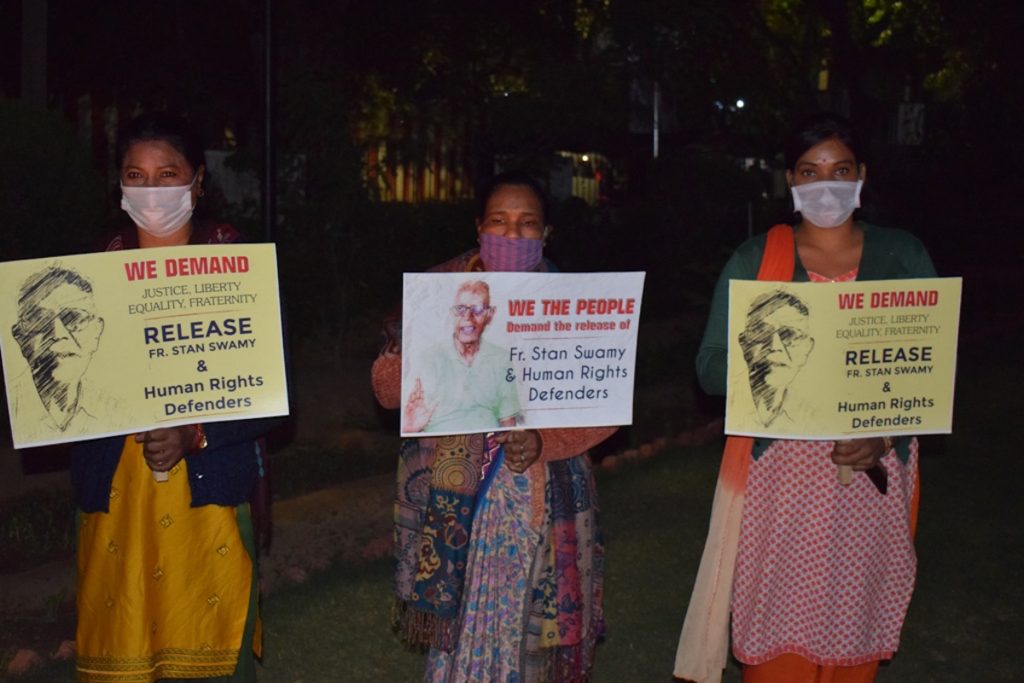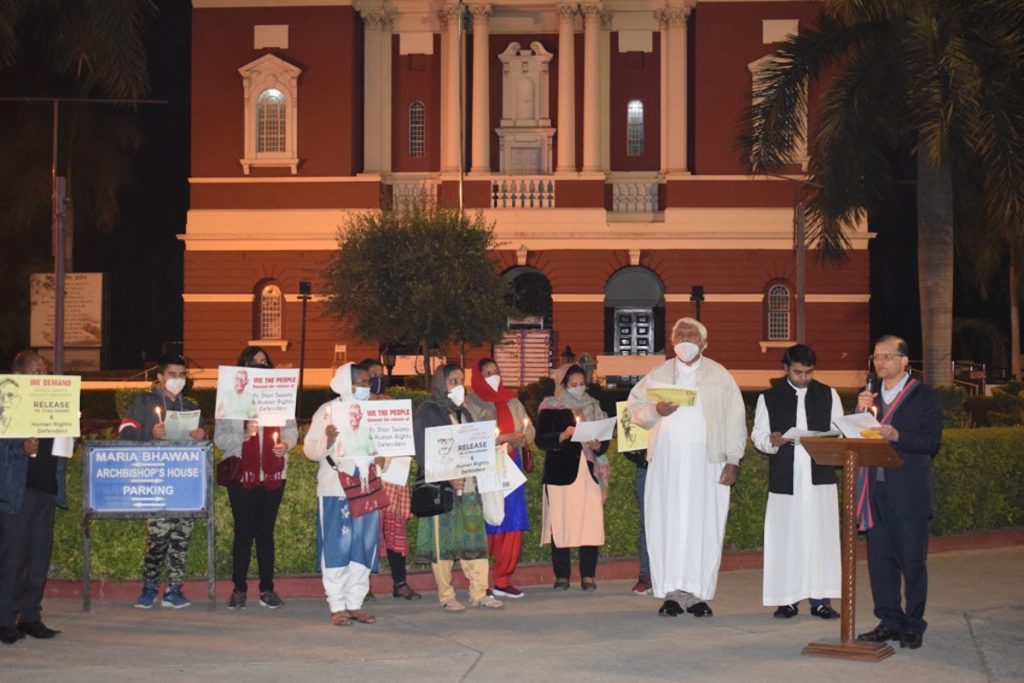Following widespread condemnation, imprisoned Father Stanislaus Lourduswamy SJ, popularly known as Stan Swamy, was finally provided with a straw and sipper to consume liquids, almost 50 days after he pleaded with the courts for the items.
Tribals rights activist Father Swamy is lodged in Taloja Jail, Mumbai in western Maharashtra state. He has been detained since Oct. 8.
“We have provided him a sipper and straw,” Sunil Ramanand, additional director general of Police (Prisons) told a Mumbai daily Nov. 29.
Jail authorities relented after facing flak for denying the 83-year-old priest the straw and sipper but his demand for warm clothes and a blanket are yet to be met.
Father Swamy’s fingers are reportedly unsteady due to his suffering Parkinson’s Disease and he cannot hold a tumbler. He had been managing with a baby sipper he bought from the prison hospital.
He has fallen multiple times in jail and suffers from impaired hearing. Inmates have helped him bathe, wash his clothes and do other daily chores.
The attitude of the court and jail authorities has been condemned as callous and social media users have berated the authorities.
Terror-related charges
The National Investigating Agency (NIA), the federal agency empowered to combat terrorism, arrested the priest at his residence in Ranchi, capital of eastern Jharkhand state on Oct. 8. They charged him under the stringent Unlawful Activities Prevention Act (UAPA).
Father Swamy is the oldest person in the country to face terror-related charges and he has joined 15 others including human rights activists, journalists and scholars arrested in connection with the controversial Bhima Koregaon-Elgar Parishad case.
The priest sought interim bail on account of his failing health and age, but a special court dismissed his request on grounds that he was arrested under UAPA.
When he was lodged in the Taloja Jail, he had requested the special court for a straw and sipper.
But on Nov. 6, the court adjourned the matter by 20 days and even on the said date, he was not provided the basic necessity as the court said they had not confiscated it and were not in possession of the items.
The court then rejected his application and his lawyers had to file a fresh hearing for the sipper and straw that would made on Dec. 4.

This irked civil society groups, lawyers and others who sent large numbers of sippers and straws to the jail to shame the authorities.
“This is insensitivity on the part of the court. The super citizen was only asking for a basic need,” said retired Supreme Court Justice Madan B Lokur.
Draconian law
On Nov. 26, webinars and functions were held seeking the upholding of constitutional values and freedom to defenders of it like Father Swamy. Speakers decried the reckless use of the draconian UAPA to silence resenting voices.
A national vigil was held at the Jesuit-run Indian Social Institute (ISI) and at the Sacred Heart Cathedral in Delhi, the national capital on Nov. 26, Constitution Day.
Father Denzil Fernandez, executive director of ISI, said: “The UAPA is a totally unjust and absolutely draconian law that is being misused and abused by those in power. This law is meant for conspiracy and terror-related cases.”
Father Fernandez said Father Swamy had been working to help undertrial tribals who were fighting for their rights but were arrested in false and fabricated cases. “It is ironical that now he himself is an undertrial implicated in a fabricated case,” he said.
Father Fernandez said Father Swamy was fighting for the implementation of laws passed by the parliament for the tribals and their constitutional rights and he is now branded anti-national and jailed.
“If a government is afraid of an 83-year-old sickly person then this is the weakest government in the history of the world,” Father Fernandez added.
‘Ready to pay the price’
Before his arrest, Father Swamy said that “what is happening to me is not something unique happening to me alone. It is part of a broader process that is taking place all over the country.”
He said it is common knowledge that figures from all walks of life — from lawyers to student leaders — are jailed for expressing dissent or questioning “the ruling powers of India.”
The priest said he was “ready to pay the price, whatever be it.”
From prison Father Swamy later told supporters: “Listening to fellow prisoners is my joy in Taloja prison. I see God in their pains and smiles.”
On Oct. 26, the Federation of Asian Bishops’ Conferences (FABC) called for his immediate release.
“It is with great shock and agony the FABC heard of the arrest of the 83-year-old… and we are surprised at the charges brought against him,” Cardinal Charles Maung Bo of Yangon, Myanmar, president of the FABC, said in a statement.

The arrest and imprisonment of the Jesuit priest has led to protests by priests, religious, people’s organizations, activists, intellectuals and concerned citizens from across India.
Those arrested in the controversial Bhima Koregaon-Elgar Parishad case besides Father Swamy are: SurendraGadling, SudhirDhawale, Rona Wilson, ShomaSen, Mahesh Raut, VaravaraRao, SudhaBharadwaj, Arun Ferreira, GautamNavlakha, Vernon Gonsalves, AnandTeltumbde, HanyBabu, JyotiRaghobaJagtap, SagarTatyaramGorkhe and Ramesh MurlidharGaichor.
The Bhima-Koregaon case relates to the violence that erupted in the vicinity of a memorial in the village of that name in Maharashtra state on Jan. 1, 2018. The violence left one dead and several injured. People had gathered at the village to mark the 200th year of the Battle of Bhima Koregaon. The event was allegedly funded by Maoists and the NIA have claimed that Father Swamy is linked to Maoist activities and had a role in instigating the violence.
The Battle of Bhima Koregaon occurred on Jan. 1, 1818, when soldiers of the East India Company, along with a large number of ‘Mahars’ or leather workers, defeated a much larger force of the upper caste Peshwa faction of the Maratha Empire. Since then, Dalit people, or so-called members of depressed classes, have assembled at Bhima Koregaon to commemorate their victory on Jan. 1.






